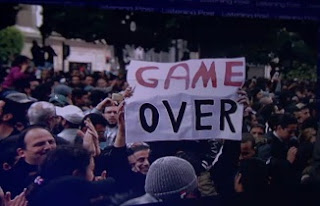 Egyptian President Hosni Mubarak left yesterday an impression that his step down will not be quick and easy. He formed an old-new government, and asked his deputy Omar Suleiman to initiate immediate dialogue with opposition and pledged to work to address the economic crisis and repair the damage caused by the ongoing popular demonstrations against him since January 25.
Egyptian President Hosni Mubarak left yesterday an impression that his step down will not be quick and easy. He formed an old-new government, and asked his deputy Omar Suleiman to initiate immediate dialogue with opposition and pledged to work to address the economic crisis and repair the damage caused by the ongoing popular demonstrations against him since January 25.These reforms were dismissed as inadequate by opposition figures began gathering on the eighth day of the uprising for the planned “march of a million” in Cairo's Tahrir Square, which has been the focal point of protests in the capital and served as the meeting area for the march.
Many protesters defied a curfew to bunker down overnight, they were joined by thousands of others soon after dawn, some toting signs reading "Mubarak Out," while others carried posters showing beleaguered Mubarak hanging from a noose.
Al-Jazeera correspondent reported that the number of protesters have exceeded a million.
Another million-strong march is planned in the Mediterranean port city of Alexandria, as national train services were cancelled in an apparent bid to stymie protests.
A committee of Egyptian opposition groups and activists pledged on Tuesday that they would hold no negotiations with the regime until beleaguered Mubarak "leaves," a statement said.
The Egyptian army stated clearly on Monday that it would not stop protests adding that "freedom of expression" was guaranteed to all citizens using peaceful means. "To the great people of Egypt, your armed forces, acknowledging the legitimate rights of the people," stress that "they have not and will not use force against the Egyptian people," said the statement. It was the first such explicit confirmation by the army that it would not fire at demonstrators who have taken to the streets.
After deadly clashes in which around 125 people were killed in Cairo and other cities, protesters complained that police were using excessive force.
The US seems to have abandoned Mubarak regime.
White House spokesman Robert Gibbs Gibbs criticized Mubarak for not taking sufficient steps to respond to the demands of demonstrators who have not been satisfied by his moves to change the government and appoint Suleiman, the longtime intelligence chief and a close confidant, to the new position. Gibbs noted that the US continues to review its aid to Egypt, a $1.5 billion annual package comprised mostly of military assistance.
Mubarak’s change for the government revealed the depth of the crisis he is facing. According to reliable sources quoted by As-Safir newspaper, the squad came as such tragic only because many of the candidates for membership refused to join them, and some of the names closed their telephones because they do not want to be on “the boat about to sink”. Thus, the source said, the new ministers were simply close and available, who can’t form a last line of defense to Mubarak.
New York Democratic Rep. Gary Ackerman on Monday said “the Egyptian people have made their wishes very clear”. “It is time for President Mubarak to step down and allow Egypt to move forward into a new era of democracy, human rights and the rule of law.”
The Obama administration has also sent on Monday its diplomat, Frank Wisner, who knows Mubarak to Cairo. The choice of Wisner raised questions about whether the administration was using him as an emissary to gently prod Mubarak to resign.
